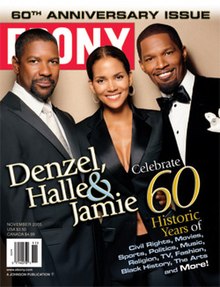
Back إبوني (مجلة) Arabic Ebony (Zeitschrift) German Ebony Finnish Ebony (magazine) French Ebony Italian エボニー (雑誌) Japanese 에버니 Korean Ebony Dutch Ebony Polish Ebony Portuguese
 | |
| Former editors |
|
|---|---|
| Categories | Lifestyle magazine |
| Frequency | Monthly |
| Total circulation (2017) | 1,333,421[1] |
| Founder | John H. Johnson |
| First issue | November 1, 1945[2] |
| Company | Ebony Media Operations, LLC (2016–present) Johnson Publishing Company (1945–2016) |
| Country | United States |
| Based in | Louisville, Kentucky, U.S. (2020-Present) Los Angeles, California, U.S.[3] (2017–2020) Chicago, Illinois, U.S. (1945–2017) |
| Language | English |
| Website | www |
| ISSN | 0012-9011 |
Ebony is a monthly magazine that focuses on news, culture, and entertainment. Its target audience is the African-American community, and its coverage includes the lifestyles and accomplishments of influential black people, fashion, beauty, and politics.[4][5]
Ebony magazine was founded in Chicago in 1945 by John H. Johnson, for his Johnson Publishing Company. He sought to address African-American issues, personalities and interests in a positive and self-affirming manner.[6] Its cover photography typically showcases African-American public figures, including entertainers and politicians, such as Dorothy Dandridge, Lena Horne, Diana Ross, Michael Jackson, former U.S. Senator Carol Moseley Braun of Illinois, U.S. first lady Michelle Obama, Beyoncé, Tyrese Gibson, and Tyler Perry. Each year, Ebony selects the "100 Most Influential Blacks in America".[7]
After 71 years, in June 2016, Johnson Publishing sold both Ebony and Jet, another Johnson publication, to a private equity firm called Clear View Group. The new publisher is known as Ebony Media Corporation.[8][9] After the publication went bankrupt in July 2020, it was purchased for $14 million by Junior Bridgeman in December 2020.
- ^ Circulation of select African American magazines in the United States in 2nd half 2015, by type(in thousands).Retrieved April 21, 2020.
- ^ Sharon Shahid (October 29, 2010). "65 Years Ago in News History: The Birth of Ebony Magazine". Newseum.org. Archived from the original on January 27, 2013.
- ^ Robert Channick (May 5, 2017). "Ebony cuts a third of its staff, moving editorial operations to LA". Chicagotribune.com. Retrieved June 8, 2019.
- ^ Barnett, Marlo; Flynn, Joseph E. (2014). "A Century of Celebration: Disrupting Stereotypes and Portrayals of African Americans in the Media". Black History Bulletin. 77 (2): 28–33. doi:10.1353/bhb.2014.0005. JSTOR 10.5323/blachistbull.77.2.0028. S2CID 245659860. Project MUSE 814089.
- ^ Krishnan, Satya P.; Durrah, Tracy; Winkler, Karen (July 1997). "Coverage of AIDS in Popular African American Magazines". Health Communication. 9 (3): 273–288. doi:10.1207/s15327027hc0903_5.
- ^ Wormley, J. Carlyne; Heinzerling, Barbara; Gunn, Virginia (1998). "Uncovering history: An examination of the impact of the Ebony Fashion Fair and Ebony magazine" (PDF). Consumer Interests Annual. 44: 148–150.
- ^ "From Negro Digest to Ebony, Jet and Em – Special Issue: 50 Years of JPC – Redefining the Black Image". Ebony. November 1992. Archived from the original on March 28, 2007.
- ^ EL'Zabar, Kai (June 16, 2016). "EBONY JET SOLD!". The Chicago Defender. Archived from the original on June 17, 2016. Retrieved July 21, 2016.
- ^ Ember, Sydney; Fandos, Nicholas (July 2, 2016). "Pillars of Black Media, Once Vibrant, Now Fighting for Survival". The New York Times.